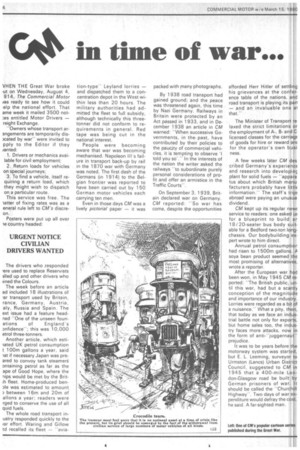Cdk4 in time of war...
Page 46

If you've noticed an error in this article please click here to report it so we can fix it.
VHEN THE Great War broke ,ut on Wednesday, August 4, 914, The Commercial Motor ias ready to see how it could elp the national effort. That ame week it mailed 3500 not:es entitled Motor Drivers — reight Exchange.
''Owners whose transport arangements are temporarily dis)cated by war" were invited to pply to the Editor if they /anted: 1. Drivers or mechanics available for civil employment; 2. Return loads for vehicles on special journeys; 3. To find a vehicle, itself requiring a return load, which they might wish to dispatch
on a particular route. • This service was free. The latter of fixing rates was as a eneral rule left to CM's discreon.
Posters were put up all over le country headed:
URGENT NOTICE CIVILIAN DRIVERS WANTED
The drivers who responded ,ere used to replace Reservists 311ed up and other drivers who lined the Colours.
The week before an article ad included 18 illustrations of .ar transport used by Britain, rance, Germany, Austria, aly, Russia and Spain. The ext issue had a feature headned "One of the unseen foun ations of England's anfidence"; this was 10,000 etrol three-tonners.
Another article, which estilated UK petrol consumption t 100m gallons a year, said let if necessary Japan was preared to convoy tank steamers antaining petrol as far as the ape of Good Hope, where the nips would be met by the Britt' fleet. Home-produced benale was estimated to amount ) between 16m and 20m of allons a year; readers were rged to conserve the use of all quid fuels.
The whole road transport inustry responded quickly to the tar effort. Waring and Gillow td recalled its fleet — "avia
tion-type" Leyland lorries — and dispatched them to a concentration depot in the West within less than 20 hours. The military authorities had admitted the fleet to full subsidy, although technically this threetonner did not conform to requirements in general. Red tape was being cut in the national interest.
People were becoming aware that war was becoming mechanised. Napoleon Ill's failure in transport back-up by rail in the 1870 war with Germany was noted. The first dash of the Germans (in 1914) to the Belgian frontier was reported to have been carried out by 150 German motor vehicles each carrying ten men.
Even in those days CM was a lively pictorial paper — it was packed with many photographs.
By 1 938 road transport had gained ground; and the peace was threatened again, this time by Nazi Germany. Railways in Britain were protected by an Act passed in 1933, and in December 1938 an article in CM warned: "When successive Governments, in the. past, have contributed by their policies to the paucity of commercial vehicles, it is tempting to observe 'I told you so'.In the interests of the nation the writer asked the railways "to subordinate purely personal considerations of profit and offer an armistice in the Traffic Courts".
On September 3, 1939, Britain declared war on Germany. CM reported: "So war has come, despite the opportunities
afforded Herr Hitler of settling his grievances at the conference table of the nations, and road transport is playing its panl — and an invaluable one al that."
The Minister of Transport re laxed the strict limitations or the employment of A-, Band C licensed classes for the carriage of goods for hire or reward an for the operator's own busi ness.
A few weeks later CM des cribed Germany's experience and research into developinc plant for solid fuels — "appara tus about which British manu facturers probably have little information." The staff's trip.1 abroad were paying an unusua dividend.
CM kept up its regular newt service to readers: one asked u: for a blueprint to build ar 18/20-seater bus body suitable for a Bedford two-ton longchassis. Our bodybuilding expert wrote to him direct.
Annual petrol consumptior had risen to 1500m gallons. A soya bean product seemed the most promising of alternatives, wrote a reporter.
After the European war had been won, in May 1945 CM reported: "The British public, until this war, had but a scanty conception of the magnitude and importance of our industry. Lorries were regarded as a bit of a nuisance." What a pity, then, that today as we face an industrial battle not only for export, but home sales too, the industry faces more attacks, now in the form of anti-"juggernaut"
prejudice. .
It was to be years before the motorway system was started, but E. L. Leeming, surveyor to Urmston (Lancs) Urban DistriCt Council, suggested to CM in 1945 that a 400-mile London-Glasgow road be built by German prisoners of war, It should be called the "Churchill Highway''. Two days of war expenditure would defray the cog; he said. A far-sighted man.
































































































































